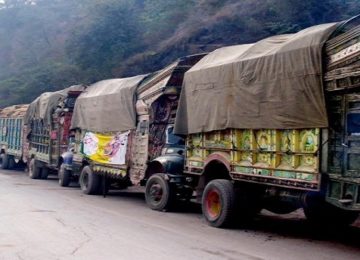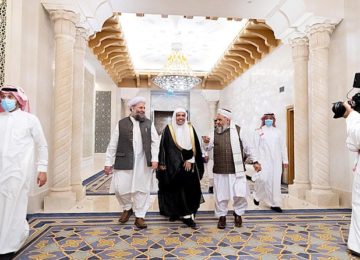Lt Cdr (r) Ihsan Ghani, former National Coordinator of the National Counter Terrorism Authority (NACTA), spoke to the Center for Research and Security Studies (CRSS) on the progress of NACTA during his tenure from August 2015 to July 2018. He also spoke on NACTA’s way forward under the incoming government in Pakistan.
“There is no glory in policy-making in our country – Pakistan. Glory is on the operational side. That is why, most people are hesitant to take up the job of policy formulation, especially when an institution is in the making; fate and outcomes are in grey areas”, said Ihsan Ghani.
Speaking to CRSS, Ghani said, “When I took charge of NACTA, it comprised of 3 to 4 rooms in the S-Block, Pak Secretariat. There were only 4-5 officers dealing primarily with finance and administration. I could have said that I neither have the budget, nor a place to sit, nor officers to start work with. However, I also a second option, which I took, was to start working with the limited resources we had at that time, and hence other things would keep pouring in gradually over time”.
Commenting on what has been done so far, including the impediments faced and the way forward, the former NACTA’s National Coordinator said that given the circumstances, NACTA has come a long way, however there is still much left to do.
Ghani stated that one of his achievements was the formulation of National Counter-Terrorism Policy guidelines, which serve as the pathway towards an inclusive, connected, peaceful and harmonious society. These guidelines have been shared with the provinces after their formal approval. The provinces have already started working on a few of the things mentioned in that document. He said that the draft had been prepared in consultation with academics, clerics and the media after an 18-month-long strenuous effort following a multi-disciplinary policy-making model.
NACTA, he said, believes that these guidelines are the bed-rock for joining hearts and minds, and effectively puts an end to the supply line of extremism by engaging the ‘war of ideas’. It, however, requires a whole-of-government and society approach to implement these guidelines.
His second accomplishment was the preparation of a basic framework for revamping the criminal justice system. He felt that any country that does not have an efficient and functional criminal justice system will always suffer. It needs proper attention and overhauling.
Afterwards, NACTA started working on a robust National Narrative on extremism, sectarianism, terrorism and militancy which would serve as the corner stone of ideological response to non-traditional threats. NACTA adopted a formulation model which comprised of a three-pronged plan i.e., a) Multi-disciplinary stakeholders and experts were invited in relevant fields and in accordance with themes. They were assigned themes in area of their lifelong expertise and knowledge to deliberate upon. b) Small groups and cross functional groups were structured for a series of round table discussions. c) A National Narrative workshop was held from 14 to 15 January, 2017, for developing guidelines to formulate a policy document.
After all these deliberations, a document of National Narrative was formulated, but due to red-tape-ism and bureaucratic lethargy, the files just moved horizontally and could not be approved by the Minister. Believing that Madrassas had to be partners with the state, NACTA engaged Ittehad-e-Tanzeemat-e-Madaris Pakistan (ITMP) on the issue of registration forms for Madrassas. “To our surprise, they cooperated more than we expected. Working jointly, we reduced the registration form from some 75 points to just a few points and both sides nodded in agreement on that, but that, too, could not be pursued further due to the same bureaucratic impediments”, the former National Coordinator dismally stated.
Now that the National Narrative document is ready; it is up to the next government to approve and utilize it and work towards the operationalization phase of this document, if they like to do so, Ihsan Ghani said, impressing upon a sense of urgency. “It was also recommended by NACTA that all the provincial units should be at the same level before the effective execution of the above mentioned plans, otherwise these will not be effective at all,” he further clarified.
Ghani apprised CRSS that, “The most significant thing we at NACTA have done is about choking the financing for terrorism. When I took over, I observed that police was not part of the effort to choke the financing of terrorism. In my view, the police is well-suited to serve this purpose, because they are the first responders, investigators, and have wide-spread reach. So, what I recommended was that the police should make ‘choking terror financing’ as an essential part of their training through different relevant organizations, such as Federal Investigation Agency (FIA) and the State Bank of Pakistan (SBP)”.
Moreover, he said, numerous organizations were involved in choking terror financing, but there was a lack of coordination among them. So, a National Task Force for choking financing for terrorism, comprising of 27 relevant organizations was established within NACTA; serving as a coordinating body. Ghani stated that the next step which should have been taken before is now up to the incoming government. This includes making this task force more inclusive by accommodating other relevant stakeholders, and letting it evolve into an independent authority – which would not only coordinate, but also take part in operations, investigation etc.
Commenting on the mainstreaming policy, ex-NACTA official said that the National Counter Extremism Policy guidelines explicitly chalk out a roadmap for that. One of the pillars in the whole framework is that of rehabilitation, re-integration, and renunciation, but one should understand that NACTA is not an implementing body.
He suggested that a broad-based dialogue on mainstreaming is still required, but before that, the first thing to do in this regard is the categorization of extremist/terrorist groups/people, based on different factors. “NACTA has been facing a major problem of categorization under the Fourth Schedule. I saw a lot of names that are illogically placed in the Fourth Schedule. The listing of names is done by the police, which majority considers as a political tool used by the elites and privileged groups. Thus process and the mechanism of categorization under the Fourth Schedule should be made more transparent and objective”, he added.
He further said that “NACTA also reached-out to different universities and interacted with the youth on counter extremism. What we could not do is how to reach out to the significant portion of the population – which includes laborers, street-hawkers etc., who are more prone to extremism. We had a few ideas and also discussed them, but unfortunately with the termination of my term, we could not initiate these”.
Highlighting the three major endogenous structural issues, he said that NACTA’s performance has been significantly impacted by lack of ownership by the Prime Minister House, the Ministry of Interior wanting NACTA to work as its subsidiary and holding back or uneven flow of finances from the Ministry of Finances. He also mentioned that, contrary to the general notion, the military was cooperative and sometimes more eager to get the job done.
Towards the end of the interview, the ex-National Coordinator NACTA said that, “We should have done a lot more and we could have done more, but some internal and external impediments made NACTA’s journey a bumpy one”.
© Center for Research and Security Studies (CRSS) and Afghan Studies Center (ASC), Islamabad.







